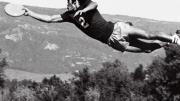Schlesinger: The Imperial Historian, by Richard Aldous (W.W. Norton, $29.95). If current events have you yearning for administrations past, this biography of Arthur M. Schlesinger Jr. ’38, JF ’43—historian, faculty member, and author, in many senses, of the Camelot version of the Kennedy presidency—may fit the bill. Aldous, himself an historian at Bard, is well suited to take stock of the historian/popularizer/public figure, “always ready to write.”
The Lost Founding Father: John Quincy Adams and the Transformation of American Politics, by William J. Cooper (Liveright, $35). Looking even deeper into the country’s past, to a still-earlier Harvardian president (A.B., A.M., LL.D.), Cooper, an emeritus historian at Louisiana State, exhumes a world-traveled leader who “occupies a camouflaged position in U.S. history.” Adding to the Crimson resonances, the author took up work begun by his academic mentor, David Herbert Donald (later Harvard’s Warren professor of American history), but left unfinished at his death.
Improbable Destinies: Fate, Chance, and the Future of Evolution, by Jonathan B. Losos (Riverhead, $28). The Lehner professor for the study of Latin America (and, more to the point, curator in herpetology) accessibly explains evolution as an experimental science, helping lay readers understand what is determined and what contingent in life’s procession. (Read about his recent work on lizards’ swift adaptation to climate change at harvardmag.com/anoles-17.) In Darwin’s Backyard (W.W. Norton, $27.95), James T. Costa, RF ’05, travels back in time to the domestic experiments and puttering that underscored the development of the world-changing theories.
Gorbachev: His Life and Times, by William Taubman ’62 (W.W. Norton, $39.95). A sweeping life of the “hard to understand” leader (in his own words) who drained the Soviet swamp—and perhaps set in motion the events that led to the perils of Putin-era Russia. The author, an Amherst political scientist emeritus, won a Pulitzer Prize for his biography of Khrushchev. Nonspecialists will be grateful for the 11-page “cast of characters,” like those accompanying a vast Russian novel, given the similar scope.
The Written World: The Power of Stories to Shape People, History, Civilization, by Martin Puchner, Wien professor of drama and of English and comparative literature (Random House, $32). Drawing on his course on world lit (in the classroom and online), the two-time Norton anthology editor makes a breathtaking leap from Homer to Derek Walcott, illustrating why it is impossible to imagine a world without literature.
100 Amazing Facts About the Negro, by Henry Louis Gates Jr., Fletcher University Professor (Pantheon, $40). Riffing on the 1957 100 Amazing Facts About the Negro with Complete Proof by the Pittsburgh Courier’s Joel A. Rogers, and columns from The Root, Gates explores Malcolm X at Oxford, the emperor of Mali, Homer Plessy of the eponymous litigation, and more.
A Century of Wealth in America, by Edward N. Wolff ’68 (Belknap/Harvard, $39.95). A New York University economist provides a definitive examination of the “remarkable growth in household wealth” during the twentieth century, and the equally remarkable “sharp increase in wealth inequality” during the past four decades—along with the status of those who did not benefit from that great skewing. Scholarly, but with wide application to public discourse.
Saamaka Dreaming, by Richard Price ’63, P.D. ’70, and Sally Price ’65 (Duke, $26.95 paper). How can you not like people who begin a memoir about doing anthropology in Suriname this way: “Despite physical discomforts, periods of boredom, ailments ranging from funguses…to hepatitis, and periodic ridicule for being culturally clueless, we have always loved ethnographic fieldwork.” A charming guide to a lost world.
Straight Talk on Trade: Ideas for a Sane World Economy, by Dani Rodrik, Ford Foundation professor of international political economy (Princeton, $29.95). An assessment of globalization, by a critic, in light of resurgent populist and nationalist economic policymaking. The author aims for a middle course: a global political economy buffered by nationalist characteristics, if you will.
An American Family: A Memoir of Hope and Sacrifice, by Khizr Khan, LL.M. ’86 (Random House, $27). The Gold Star parent, an immigrant from Pakistan, did more than any other speaker at the 2016 conventions to illustrate the stakes—for individuals and the larger society—in then-candidate Donald Trump’s antipathy to migrants and open borders; here, he amplifies the narrative. In The Other Side of Assimilation: How Immigrants Are Changing American Life (University of California, $29.95 paper), Tomás R. Jiménez, Ph.D. ’05, a sociologist at Stanford, takes a scholarly, but warm and accessible, look at how newcomers change those in whose midst they arrive, as America is “remade through a bumpy process.”
Greater than Ever: New York’s Big Comeback, by Daniel L. Doctoroff ’80 (PublicAffairs, $28). The Big Apple’s post-9/11 economic recovery, as recounted by the then-deputy mayor. As the national discourse turns slightly less kindly toward cities—and in the wake of calamities like those that recently befell Houston—an optimistic urbanist voice is especially welcome and timely.
Ultimate Glory: Frisbee, Obsession, and My Wild Youth, by David Gessner ’83 (Riverhead, $16 paper). The title and subtitle accurately capture a loving recollection of youth, doubled: the author when young, wholly given over to a sport then in its infancy.
Spy Schools, by Daniel Golden ’78 (Henry Holt, $30). Golden, whose journalism has probed both admissions to elite colleges and the shortcomings of for-profit schools, now looks at how domestic (CIA, FBI) and international intelligence agencies pursue their work on campuses: gleaning pertinent research findings, developing sources (and potential talent) from among faculty members and students, and more.
True Gentlemen: The Broken Pledge of America’s Fraternities, by John Hechinger (PublicAffairs, $28). At a time of seemingly unending debate at Harvard about whether to sanction final clubs, fraternities, and sororities and the students who join them, it may be sobering to take a deep dive into the real deal—a national fraternity, plagued by excess alcohol, fatal hazing rituals, and more—in the skilled hands of the veteran education reporter.








